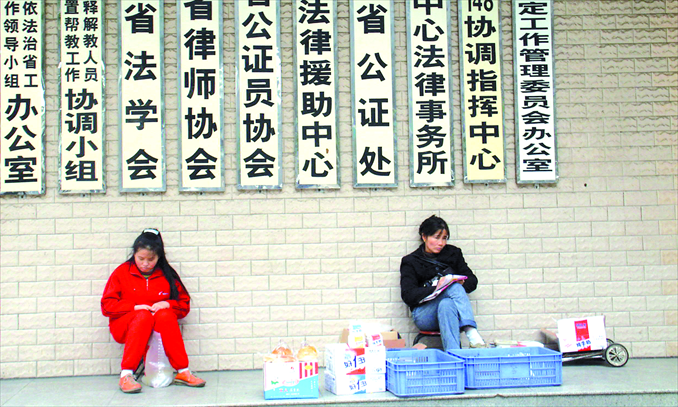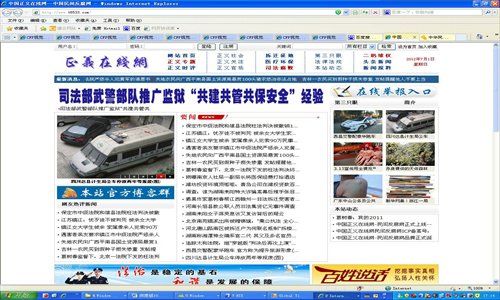Uploading graft

The Chinese authorities have closed more than 89 non-governmental websites since March that claimed to be engaged in fighting corruption, according to a notice issued by the State Internet Information Office on June 19. The offending sites were shut down for fraud or blackmail.
While a few netizens applauded the crackdown on illegal online operations, others were worried this would undermine civil society's watchdog efforts.
"Non-governmental anti-corruption websites are an important supplement to official anti-corruption efforts, but they need to be well managed and regulated," Ren Jianming, a professor from School of Public Policy and Management, Tsinghua University, told the Global Times.
Liu Yongfeng, deputy chief editor of lianzheng.com.cn, a website combating corruption run by the China Fangzheng Press under the Central Commission for Discipline Inspection of the CPC and the Ministry of Supervision, explained that misunderstandings had contributed to the controversies.
"The central government has never ceased cracking down on corruption. All these websites were closed due to their offences, which has not only damaged the Internet's credibility but disturbed normal anti-corruption activities," Liu told the Global Times.
Liu said those closed represent just a small number, and that about 700 anti-corruption websites, governmental or otherwise, still operate.
Money maker
While these prospering anti-corruption websites are generally applauded by legal specialists and the grass-roots society, people soon found that these sites could easily become moneymaking tools through illegal operations since their teeming last year.
Through collecting corruption-related stories and offering a platform for netizens to post their grievance and accusations, these websites have become a new battleground against corruption. But some have used this opportunity to make easy money.
With four computers, a website, a father and son in Huazhou, Guangdong Province, managed to earn over 100,000 yuan between 2009 and 2011, the flagship program Jiaodian Fangtan (Focus) of CCTV reported on June 9.
Under different IDs, the two collected and even fabricated negative information targeting local officials on their website and then charged them money to delete the posts concerned. A township chief paid 5,000 yuan to delete posts accusing him of bribes and keeping a mistress. In December last year, the two were arrested.
"Some websites lured whistleblowers to submit tip-offs. Then they used the materials to secretly blackmail the accused," Cheng Kangming, founder of zjzyff.com, a non-governmental anti-corruption website established in 2004, told the Global Times in Beijing, adding that some even sent their representatives to extort money in person, or particularly targeted a single local government. Others use the name of legitimate organizations as a cover.
Thanks to lawful management, Cheng's website has been thriving and receives 150 letters and reports each day. Yet every month he receives up to 15 requests offering substantial payments to delete the posts. But he never does so. Liu said some even defraud enterprises and governments of money by holding honest culture forums and lecturers under the name of their publishing house and website.
Some use fake journalist identities. A government official from Xinle county, Hebei Province, said each year they were visited by some fake journalists. Most they reported to the police, but others they were forced to pay off. Last year they received an article faxed to them about a demolition dispute. Some local officials quickly rushed to Beijing and met the writer, who promised not to publish the report on their website after being paid 20,000 yuan.
"The government did nothing wrong in the case, but the official didn't want to cause them any trouble. The Internet's influence can be enormous," the anonymous official claimed.
"Without proper supervision and management, they would flourish, which would frustrate trust and enthusiasm of the whistleblowers," said Ren Jianming, an expert on corruption prevention.
"These websites can also easily be used to make malicious and false statements to slander others. Some become a platform for people to express anger and dissatisfaction. Online anti-corruption efforts should be governed by a system of laws and standards," Lin Zhe, a professor with the Party School of the CPC Central Committee was quoted as saying by Beijing News.
Risky tip-offs
Despite the risks of violation of privacy and blackmail, the websites play their role in combating corruption, Ren said, noting that tip-offs play a key role in corruption crackdown.
Many bodies, including all local governments, discipline and supervision bureaus, and procuratorates have centers to receive letters, calls and visits, and have broadened their scope to include the Internet over time. In April 2009, the revised "Regulations on People's Procuratorate Report" formerly extended reporting channels to the Internet and fax. Two months later, the Supreme People's Procuratorate (SPP) opened the anti-graft website 12309.gov.cn.
So far, the website has received more than 100,000 clues and over 200,000 appeals, nearly equal to the numbers of letters and visits the SPP received in the same time, according to Bai Huimin, an official from the reporting affairs department of the SPP.
Each year, about 140,000 officials are investigated, 80 percent of whom were exposed by tip-offs, Zhang Xixian, a professor with the Party School, told the Global Times earlier in April.

However, many informants prefer to turn to online forums, private blogs or non-governmental anti-graft websites.
"The official channels are not that easy and smooth to navigate. Some informants might not get any response or be kicked around by different departments. As a result, these unofficial channels become their last resort," Ren said.
Li Xinde, founder and manager of cnyulun.co, which claims to be the country's most influential anti-graft website and was set up in 2003, said independence and fewer restrictions also make them popular.
"Without restrictions from advertisers, censorship by superiors, or worries of bypassing the chain of command, we can release reports accusing any official, at any rank, as long as we have solid proof," Li told the Global Times, saying that some journalists, people's congress deputies and even discipline inspectors also passed materials onto him.
The website has released at least 400 cases, and Li is proud that nearly 60 percent of them were dealt with after being exposed.
On June 10, 2004, the website issued a report accusing Li Xin, the vice mayor of Ji'ning, Shandong Province, of corruption. Li was arrested 46 days later and eventually sentenced to life imprisonment for bribery.
In 2006, the website began to expose the corrupt dealings of Zeng Jinchuan, director of Chenzhou Discipline Inspection Committee. Later that year, Zeng was investigated. In November 2008, Zeng was sentenced to death for taking 31.23 million yuan in bribes.
Strong barriers
But authorities still suggest whistleblowers use official channels. In an interview with Legal Daily on June 14, Bai Huimin from the SPP said there were defects for reporting through online posts.
"First the procurators are not able to see them immediately. Second, they could alert the accused, which can impede the investigation. And they can be easily used for revenge or slanderous purposes."
Cheng and Li agreed that they have rules to avoid publishing false statements.
"We have strict requirements to ensure anything we publish is factual, even stricter than news. There must be sufficient proof," Li said, noting that sometimes he will go himself to investigate and write reports based on tip-offs.
Cheng added that he only edits and publishes those reliable posts that have been already reported through official channels and include brief replies from the government.
Other countries have their own experiences. Swati Ramanathan, co-founder of ipaidabribe.com, established in 2010 in India, said they tried to exhort people not to write the names of the accused, as well as using software to delete names.
"We also have a moderator whose job is to delete any reports that are defamatory, or inflammatory," Ramanathan told the Global Times.
Li said he was very supportive on the crackdown on those illegal websites but hoped for fewer barriers for the legal ones.
"There are always troubles, either with my website being blocked or the domain name being cancelled. Some officials with power and money used their connections to put pressure on us," Li said, adding that he has used over 20 domain names.
Cheng said as his website's server was confiscated in Langfang, Hebei Province, by police officers in early 2011, he moved the server to Hong Kong.
"Sometimes there are also calls threatening to block or hack the website if posts aren't deleted as ordered," Cheng said, adding that on June 10, they received 200,000 attacks.
Ramanathan said their website pays more importance to changing the system that breeds corruption, rather than prosecuting individual officials based on Web users' posts.
"You change the individuals, the threat of corruption remains. But change the system and you root out corruption permanently," she said. As a result, they will regularly compile reports on and analyze corrupt trends, and offer suggestions to the government. Some authorities also actively sought cooperation with them. In May, Ramanathan was happy to see ipaidabribe posters going up in key government departments all over the city of Bangalore, asking people to turn to the website if they had to pay a bribe for a government service.
They thought this would trigger a deluge of messages, but surprisingly not.
"We found that the government offices were putting up the posters at a height of 4.57 meters, barely visible unless you are Superman. So clearly, even when we think we have won a victory, setbacks lurk just around the corner, or above one's head," Ramanathan said.
Cheng and Li said they had never thought of support from the government but only hoped for a more relaxed environment.
"We could be a third party and bridge between government and people, and offer additional trustworthy channels to combat corruption. I wish the government could treat us equally. It would be better if they could offer some support and professional training," Li said.